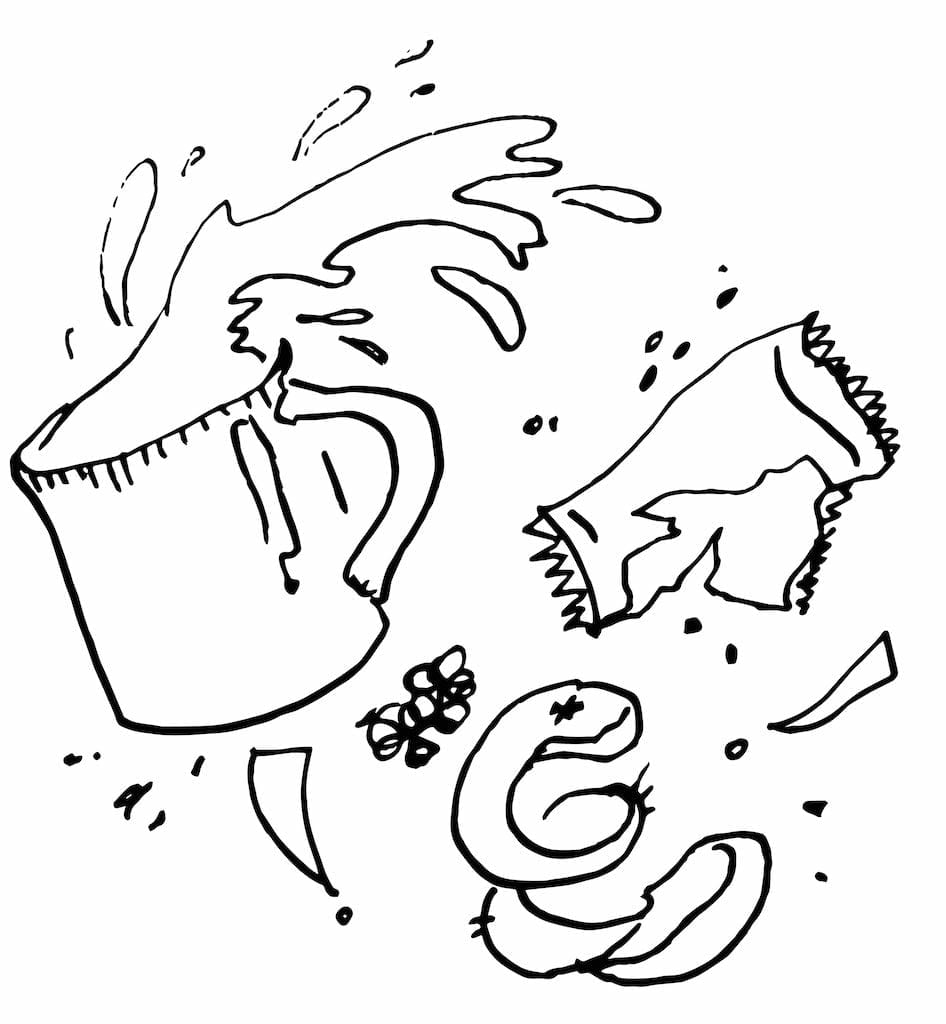Another day, another pile of crusty plates and bowls and spoons to scrape the scum off of. I head down to the first-floor kitchenette, and what do I find? Counters covered in mysteriously sticky substances. Dirty dishes left in the sink for days on end. A bottle of Smirnoff, empty (the latter trait irking me much more than the former).
I’m a salty person, not going to lie. Provided with such a convenient means of venting–and your devoted ears, of course, fair reader–I cannot help but rant, expel half-formed opinions with a side of fresh, steaming bitterness.
As of late, the lack of care with which some of the people treat the common areas in the dorms has anguished me. Though I have been at Amherst for a relatively short period of time, I certainly feel at home; seeing my home’s tables scattered with half-eaten plates of brownies, or noticing my home’s showers coated with clumps of hair, disappoints me deeply.
I hold myself to high standards, I admit–the parental regime of my childhood years strictly enforced responsibility for one’s messes. Leaving areas slightly cleaner than I find them has become a habit, and I don’t expect everyone else to partake in the same behavior.
But the lack of accountability, in regards to shared spaces, has eroded our sense of personal duty. There are no direct punishments for spilling something here or throwing something there, and at some point, someone will clean it up–so if you’re late for a class, tired after cramming for hours on end, whatever, why not just relax your ethics and leave it, for today?
Still, next time you want to peel an orange in class and leave the rind on the ground (right in the front row, too!) or dump a brown mystery food down the water fountain drain, think of the consequences.
Once upon a time, early humans congregated to create the first civilizations. With these more formal groupings of humans came a stronger society, with differentiation and specialization. Eventually, people began to share in common resources instead of hunting or farming their own food and subsisting in that manner.
This way of life was apparently successful, because it has persisted until today. And we, luckily enough, reap the benefit of our ancestors’ sacrifices–instead of scavenging for berries in the forest, we have the ability to dedicate all of our time and effort to studying at Amherst College, living off of the foods other people farm, process, cook, and serve to us.
But, of course, humans are not trustworthy creatures. We readily take advantage of the widespread prosperity at our disposal, all the while thinking of ways to augment our personal comfort and wealth. Thus, whenever given the opportunity to take advantage of any common resource, we take and take and take without pausing to rest, or even consider giving back at some point.
Within our little college ecosystem, a microcosm of society as a whole, we do a lot of taking (although this is justified by reciprocal giving, the tuition fees that we or our parents rake over every semester). All that supports our habits of never replacing the empty toilet paper rolls or leaving half-eaten pizza for someone else to possibly consume is the infrastructure carefully designed to oppose our passive, detached mindsets. A few carefully hired people behind the scenes periodically intervene to ensure that life at Amherst College continues on.
But in between their merciful cleanings of our messes, we constantly find fault with the state of things. Another innate trait of humans, I feel–we are vindictive beings. We recoil at the crumbs and dirt and grease that all of us, together, leave in our wake. We won’t do much to correct, or even stop perpetuating, widespread problems such as this one, which affect us everyday.
There are larger issues to consider, outside of the realm of Amherst, that we play an analogous role in. As citizens under a centralized government, we share in the greatest common resource of all–liberty. We take full advantage of our freedom to act and live as we wish, knowing that we will be safe. However, the liberties we are given are not perfect–indeed, no government in the history of human civilization has kept everyone happy.
So, we, as members of a democratic state, have certain powers that we may or may not choose to exert, powers that influence what liberties are given, and to whom. Those of us who are far too complacent to set a toe into the realm of politics decrease the government’s ability to adjust to the needs of the people and continue to generate for freedom and prosperity for generations to come. We will readily lament the shortcomings of the law without actually acknowledging that we could help remedy these issues by expending only the littlest bit of effort.
Those of us who finally decide to replenish the resources that we depend on make the world a slightly better place, whether in the context of politics or college life. Sometimes, the thought that our personal impact on these spheres ends up negligible haunts us, keeps us from acting, but hey–we’re part of a movement, to make a better Earth and a tidier campus.
Honestly, though, why listen to me? Seriously, I’m so petty that I wrote an article about how filthy some people leave the Stearns common room.
